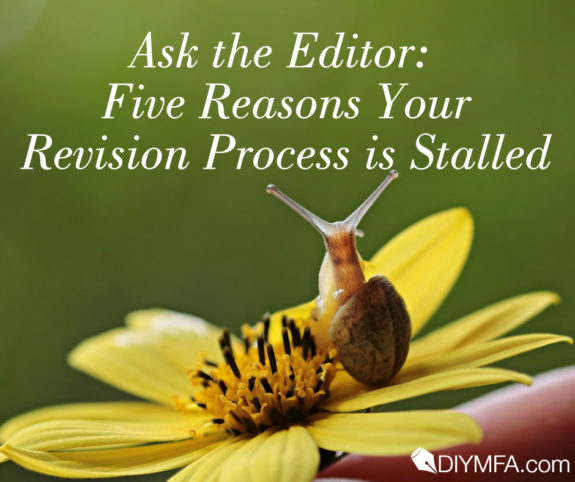I have a tendency to over-correct in my editing process. This is especially true when I receive feedback from critique partners, and it’s difficult to get centered enough within myself to know what’s actually working and what isn’t. Even when I’m not receiving critique, I tend to be self-critical and perfectionistic (not sure if that’s a word, but I’m making it one). As a result, my revision process tends to be quite clunky—especially since I often discover obvious flaws really late into the process, despite all the editing and feedback I receive during revisions. My question is, how can I make my own revision process a bit more efficient, to hopefully see more dramatic improvement in my work? Are there some strategies I can use? Or is my crafting ability just plain faulty?
Yours sincerely,
Stuck in a Never-Ending Editing Vortex
Dear Stuck,
There’s a natural order to the process of writing. Lots of people claim to have the road map for making the writing and revision process simpler, smoother, speedier . . . except that the process looks different for each writer. You absolutely can’t compare how soon you’re ready for feedback, or how quickly you can process that feedback into actionable revision steps, with how soon someone else can. That said, there are a few common reasons writers find their revisions stalled. Just remember, it’s a try/fail process to figure out what techniques make you most effective and efficient at completing your manuscript.
My first piece of advice is to take notes. Keep a record of what you tried this time, be it the Book Architecture Method of creating a series grid, or a National Novel Writing Month marathon/sprint for content creation, or any of the zillion other “proven” methods out there. The more times you do this, the more data you create to learn about what works for you. In her podcast episode titled “Honor Your Reality” Gabriela reminds us that the only best practice is the one that works for you. So keep track of what works and what doesn’t so that you don’t find yourself spinning your wheels trying the same techniques time and again with the same result.
Five Reasons Your Revision Process is Stalled (and what to do about it)
1) You submitted for critique too soon in the drafting process
If you find yourself being tossed about by feedback like a rubber duckie in a choppy sea, it’s more than likely you’ve submitted your writing for feedback too soon. Likely, it was too early in the drafting process for you to really know what you want your writing to say.
Solution: Give yourself room to rewrite the piece a few more times, and to think critically about it on your own. That way you’ll be sure of what you’re trying to accomplish with a piece, and better able to judge by the response you receive whether you’ve achieved that or not.
2) You didn’t have enough distance from the work
It’s a common mistake to rush right into the critique and revise stage without allowing yourself emotional distance from the writing. Akin to the first reason above, this has to do with submitting a piece before you (and it) are ready. Emotional distance will help you keep from taking the critique too personally, which will help you to be able to discern what feedback will be useful.
Solution: In order to achieve the appropriate distance from your writing, you have to be willing and able to detach your emotions and identity from it. That can mean putting it aside for a time before sharing it. It can also involve sitting yourself down to have a talk about not getting emotionally wrapped up. Or soliciting feedback in such a way that allows you to maintain distance, such as in written form so that you can take breaks and come back to it. Be honest with yourself and your critique partners about this emotional distance. It will save you (and them) a lot of hurt and frustration.
3) Your request for feedback is too broad
Handing someone a story and saying, “Tell me what you think!” seems so natural. But that’s probably not the best way to get targeted feedback from a reader. You can get anything from “It was great!” to “I found a few typos,” to “It’s really not my style.” None of these responses are particularly helpful if you’re trying to figure out how to make the story better.
Solution: Before you hand your story over to someone whose opinion you trust, think of a few specific questions you want them to ponder while they read your writing. Ask them to answer those questions and those questions only. That way you can be sure you’re getting feedback on specific areas you’re interested in focusing on in that draft.
4) You’re tackling too much in each revision pass
We all do it. It is hard to see past the details (grammar, punctuation, certain plot holes, etc.) as you’re reading through your work, so, instead of pushing through for the sake of the larger goal you began this revision with (one particular character’s arc, timeline inconsistencies, etc.) you stop. You fix the commas and periods, the awkward dialogue, the color of a particular character’s eyes (that you have to scan back through 200 pages to find). And eventually you forget what the larger goal was in the first place. I know the revision process can be tedious. I know the desire to hurry and get your story finished so that you can share it with the world is overwhelming sometimes, and so it seems like you should tackle all the issues at once. But it’s important to make sure you focus each revision pass on one, MAYBE two elements. That way you make sure you’re as precise as possible and you don’t miss anything.
Solution: Start with one issue, or category of issues, at a time in a simple, logical order, addressing the biggest problems first. Leave the grammar and punctuation until the very end. If you’re interested in how to break down your revisions by their hierarchy of needs, you can check out Gabriela’s Revision Pyramid here.
5) You’re not taking enough time between revision passes
When you’ve been working on something so hard and for so long, it may seem counterintuitive to put it down and walk away, but that’s what I’m telling you to do. Some people find that a break of a few weeks is enough, but some people need longer than that. After spending hours, days, weeks, months in the world of your story, you can easily forget what issues you’ve addressed. The world and the characters seem so obvious to you that you can’t tell what is on the page or what is still in your head anymore. The fatigue you feel is a real barrier to the sharpness of your attention. You may find yourself frustrated by encountering the same plot problem over and over again, but still not being able to identify the answer your story needs.
Solution: Consider how much time you’ve spent BETWEEN drafts, and then play with that amount of time. If you’re still feeling confused, frustrated, or overwhelmed after a couple of weeks, try longer. You’ll know it’s time to return to that story when you find the solutions to particular plot problems or character arc issues calling you back. In the interim, keep writing other things. And read books on story-craft. In fact, just read. Read lots of good stories, taking notes about their structure, tone, and characters.
Revising your work and receiving critical feedback can seem like an endless uphill battle. It’s such an important part of the process of writing, though, and worth as much time as it takes to do it well. The reading public is not so forgiving as your critique partners. You want to be sure that your story is the best version of itself before you release it out into the world.
How to “Ask the Editor”
Send your questions to ekauffman@writingrefinery.com. Limit yourself to a few paragraphs to introduce yourself and the problem at hand. “Brevity is the soul of wit,” after all. And keep an eye out for opportunities to send in longer submissions for critique.

Elisabeth Kauffman is a freelance editor in California. Her favorite genres are YA fantasy, sci-fi, and romance. She regularly obsesses over board games, Doctor Who, and Harry Potter. Come share your ideas with her on Facebook and Twitter and on the web at www.writingrefinery.com. Also, check out her author website and her author page on Facebook.







